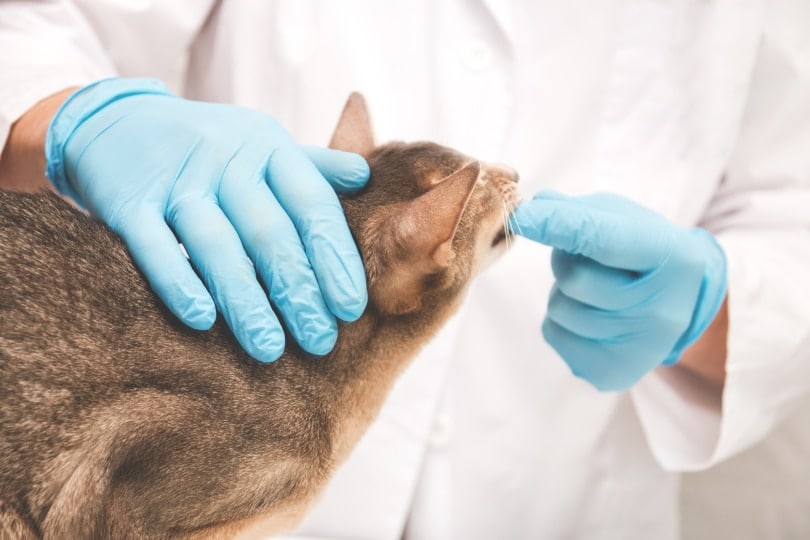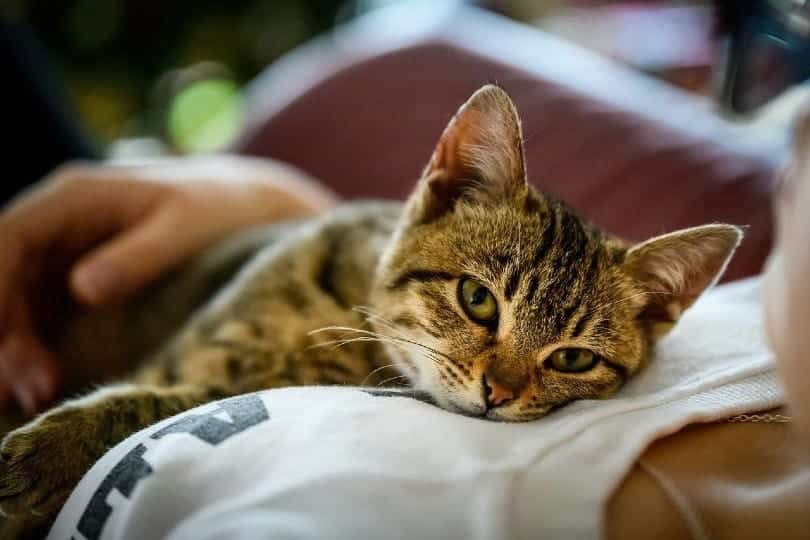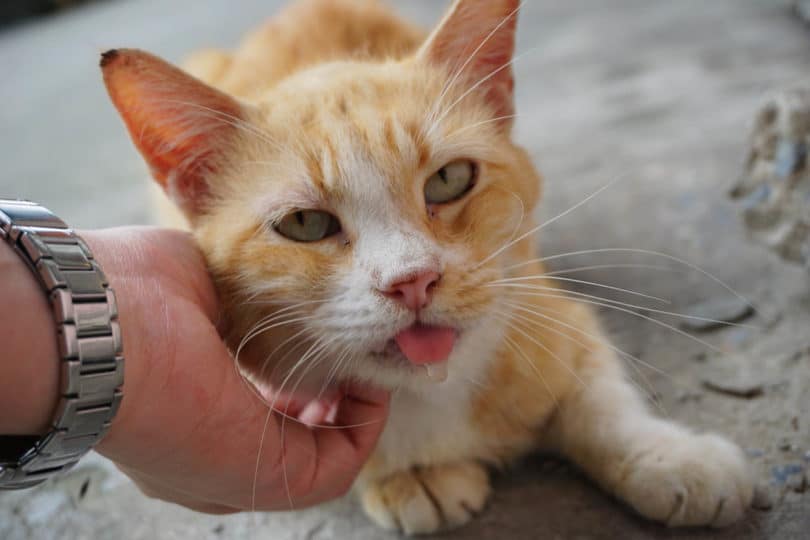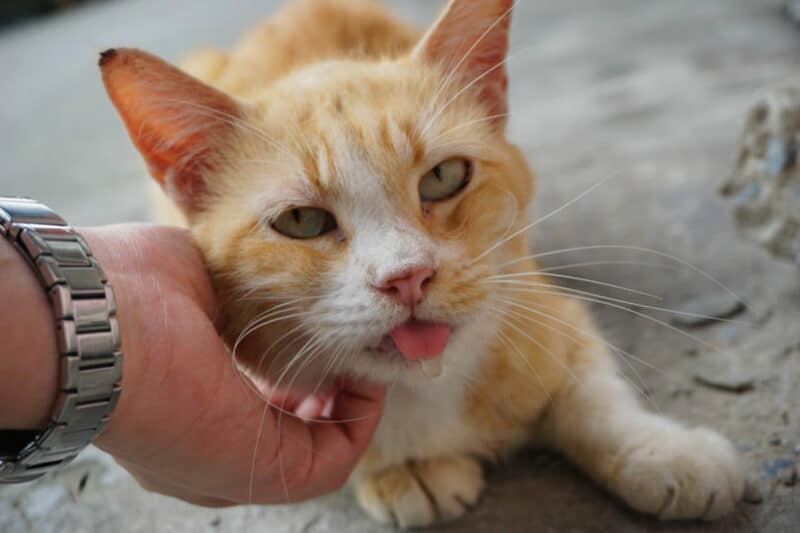It’s the end of a long day of work when you arrive home, looking for your favorite furry feline. No one comes to greet you at the door, which is a rare occurrence, so you go looking for Miss Kitty to see what mischief she’s gotten into while you were away. You find her in the bedroom, but she’s foaming at the mouth and drooling excessively! What do you do?
We’re going to tell you some of the common reasons your cat may experience foaming at the mouth and drooling, to help you determine if your furry friend needs to see a veterinarian.

The 5 Reasons Why Cats Foam at the Mouth
1. Periodontal (Dental) Disease
For some cats, excessive drooling and foaming at the mouth are caused by gingivitis and tooth decay. If you’ve been noticing that your cat has stinky breath, plaque on the surface of the teeth, or red, swollen gums, your cat may be experiencing periodontal disease. If your cat is displaying these symptoms and has issues with chewing and eating, or is drooling or foaming at the mouth, make an appointment with your vet to discuss your cat’s oral health. If left untreated, this type of issue only tends to get worse with time.
Some forms of periodontal disease are preventable, so speak with your vet about the best oral health practices for your feline. There are many options for toothpaste and toothbrushes for brushing your cat’s teeth at home. And your cat’s annual physical exam includes a checkover of their teeth to spot any problems that require further care. Advanced treatment of periodontal disease can include professional scaling, polishing, and surgical extractions of diseased teeth.

2. Ingestion of a Toxin
If your cat starts suddenly foaming at the mouth and drooling, they may have ingested a toxin, or poison, by eating, breathing, or absorbing it through their skin.
- Foaming/drooling from the mouth
- Diarrhea
- Panting
- Increased heart rate
- An increase in thirst
- Fever
- Lethargy
- Seizures
- Lack of appetite
- Vomiting
- Hiding
- Weakness
- Trouble walking
- Restlessness
- Increased urination
- Yellowing of the skin, eyes, or gums
Common toxins that your cat can be exposed to include fertilizers and plants, household cleaners, human medication, and food poisoning. Cats are notorious for a love of chewing on common household plants, such as aloe, but many are dangerous for your pet and can make them gravely ill.
Keeping common toxins locked up and protecting your plants from kitty antics are one way to prevent your cat from becoming ill. If you suspect your cat ingested a toxin, reach out to your vet immediately, or take it to an emergency hospital.
You can also call the ASPCA for advice if you believe that your cat has ingested something poisonous: (888) 426-4435. There may be a consultation fee charged for the phone call.
3. Nausea and Vomiting
Another potential reason that your cat could be experiencing foaming at the mouth and/or drooling is that they could also be experiencing nausea and/or vomiting. A common form of vomit in cats can be white if they’ve not had much to eat and are simply vomiting up liquid. Vomit can also contain worms, bile, blood, or food. If your cat isn’t eating, has diarrhea, and continues to vomit two or three times in a row, contact your veterinarian immediately. Also contact your vet right away if your cat stops drinking water and is vomiting, as this could be a sign of a serious illness or poisoning. In general, if you’re not sure, contact your vet about your cat’s vomiting.

4. Seizures
Foaming of the mouth and drooling can also occur during a seizure. A short aura often precedes a seizure, during which your cat may seek attention, hide, or appear frightened or dazed. Your cat will then fall on its side, becoming stiff, and may drool or foam at the mouth, grind its jaw, vocalize, urinate or defecate, and paddle its paws. After the seizure, your cat may appear confused, wander around, experience compulsive behavior, pace, be thirsty, want to eat, or may be blind. Call your vet for an appointment immediately to determine the cause of the seizures.
5. Viral Infections and Other Illnesses
A virus can also cause symptoms of drooling and foaming at the mouth. A simple upper respiratory infection can cause drooling, but other serious illnesses, including kidney disease, immune illnesses, and tumors can also cause drooling in your pet.
A well-known symptom of rabies is foaming at the mouth, as well as fever, seizures, breathing issues, and abnormal or aggressive behavior. If your cat is experiencing any of these symptoms, call your vet immediately, as rabies is deadly and can also be spread to humans.


Conclusion
Foaming and drooling at the mouth are symptoms that should always be taken seriously when they appear in your cat. Periodontal disease, ingesting toxins, nausea, seizures, and illnesses are all issues that can cause foaming and drool in cats.
It’s important to contact a veterinarian when these symptoms appear, so your cat can get the proper treatment to combat the issue causing the foaming and drooling, and be back to its catty self as soon as possible.
Featured Image Credit: DreamBig, Shutterstock






